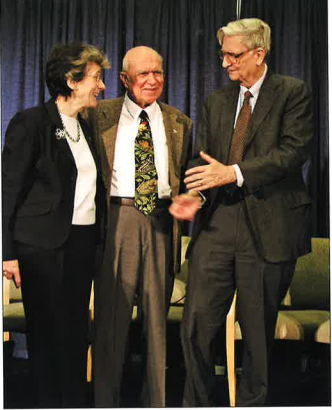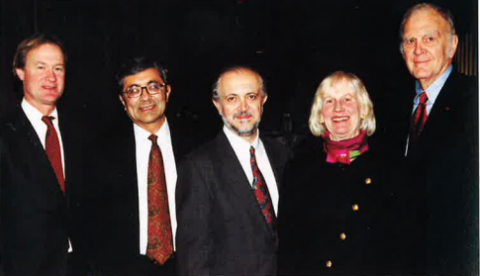In 2020, the National Council for Science and the Environment (NCSE) will celebrate the 30th anniversary of its founding. This hallmark event presents the opportunity to revisit the founding ideals and goals that have guided and shaped the NCSE mission and to reaffirm the validity of those ideals and goals. NCSE was established in 1990 and was known as the Committee for the National Institutes of the Environment (CNIE) at that time. We had a simple, straightforward goal: from its inception, CNIE was formed as a nonprofit, nonpartisan organization with a mission to have the U.S. Congress establish the National Institute of the Environment (NIE). The proposed NIE was envisioned as a standalone federal funding agency, roughly based on the structure of the National Institutes of Health (NIH).
In December 1989, we held our first organizational meeting at the National 4-H Conference Center in Chevy Chase, Maryland. There were about 100 leaders representing a vast of array of institutions—universities, nongovernmental organizations, scientific societies, government agencies, and the business community. At that meeting, we agreed on a common concern: many serious environmental problems were not being adequately addressed by federal, state, and local agencies.
We called for a thorough rethinking of the divided and incohesive federal funding system for supporting environmental sciences, since it was originally developed based on traditional scientific disciplines, which was limiting. We believed the federal focus was based on a narrow research agenda, without much interaction or cooperation among the disciplines. We proposed that a multidisciplinary approach be emphasized—both in research and education—within the academic community, one that addressed critical environmental problems through cross-cutting, innovative solutions.

Following this meeting, CNIE put together a comprehensive proposal for reorganizing the federal environmental research enterprise. Our overall goal was to “improve the scientific basis of environmental decision-making,” a mission statement adopted by our founding board that we have resolutely adhered to ever since. In March and April of 1990, CNIE testified before both the House and Senate Committees regarding the proposal to create the NIE. This led Congress, along with the National Science Foundation, to appropriate funds requesting the National Academies of Sciences (NAS) to carry out a feasibility study on the CNIE proposal.
NAS completed its feasibility study in the spring of 1993. Shortly thereafter, a bipartisan bill to create the NIE was introduced in the House, with over 100 co-sponsors. However, significant changes occurred in the U.S. Congress after the midterm elections later that year. Due to changing priorities and the federal agency landscape at that time, the bill did not pass. In response to these new political realities, we convened a board-staff retreat that was held at Airlie Conference Center in Warrenton, Virginia. At that meeting, CNIE was renamed to the National Council for Science and the Environment (NCSE), rededicating itself to its core mission of improving the scientific basis of environmental decision-making. By then, there was significant rethinking of how best to advance the organization’s goals within the federal government, working in close partnership with national, state, and local agencies.
Among the early decisions made by the NCSE Board of Directors, NCSE revived its relationship with federal agencies, especially those that had environmental, energy, and natural resource management mandates. Many long-term institutional relationships were established, bringing necessary academic and research community support for federal agencies during the agencies’ oversight and budgetary hearings in the U.S. Congress. Equally importantly, NCSE made a commitment to host annual conferences on key environmental issues, focusing on scientific, technological, and societal solutions. NCSE has done so for 19 years in strong consultation with, and support from, various federal agencies.
The inaugural NCSE Annual Conference took place January 27–28, 2000, at the historic National Academy of Sciences building on Constitution Avenue. At this inaugural conference, NCSE initiated the John H. Chafee Memorial Lecture in honor of the late senator from Rhode Island. The lecture was graced by the presence of two distinguished speakers, Drs. Sherwood Rowland and Mario Molina, who shared the 1995 Nobel Prize in Chemistry for their discovery of stratospheric ozone depletion from chlorofluorocarbons (CFCs).

Over the years, the NCSE Annual Conferences have been well attended and supported by scientists and educators of NCSE Member Institutions, as well as representatives of government agencies, research institutions, nonprofit organizations, and the private sector. In addition, NCSE founded and coordinated a number of academic-oriented activities for its Member Institutions.
As we approach the 30th anniversary of NCSE and reflect on its compelling history, it is undeniable that the organization has proven to be significantly beneficial to many individuals and institutions that prioritize the use of science to inform environmental decision-making. It is evident that the need for NCSE to continue executing the work articulated through its longstanding mission has never been more acute than it is today. We are faced with unprecedented challenges that transcend borders and touch all parts of the world, its natural ecosystem, and its human-built environment.
Today, NCSE continues to build bridges between many sectors of our society and remains dedicated to engaging scientists, decision-makers, and the public to ensure that all stakeholders come together at the table where decisions are made. Through building these bridges, NCSE strives to ensure that sound scientific knowledge informs environmental decisions for lasting, durable policies. NCSE advances its work with a priority for not engaging in politics or the politicization of science and as such, remains a trusted, credible institution. In doing so, NCSE will energize and inspire its community to demand that science be reinserted where it rightfully belongs—at the very heart of environmental decision-making at all levels of government and society.